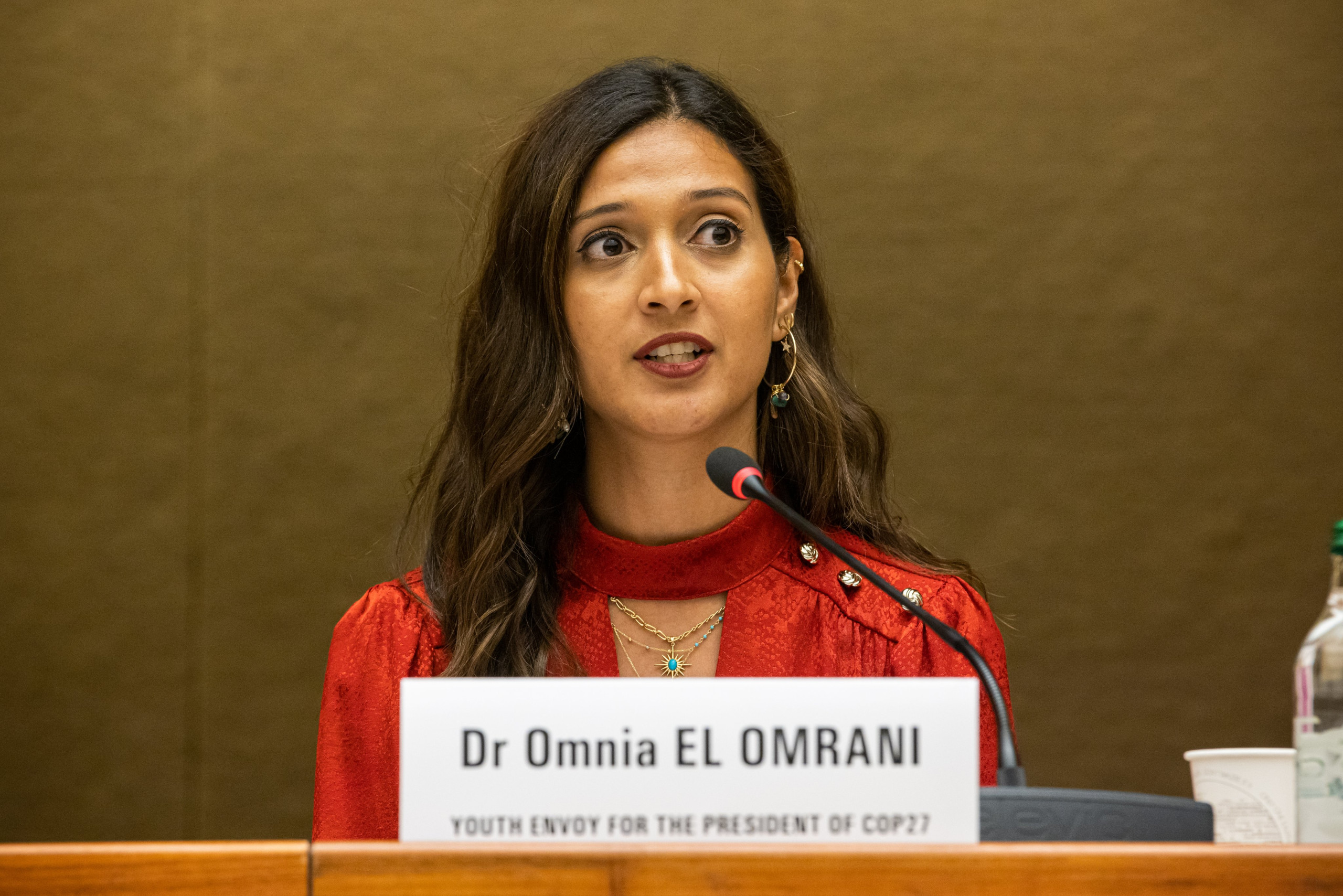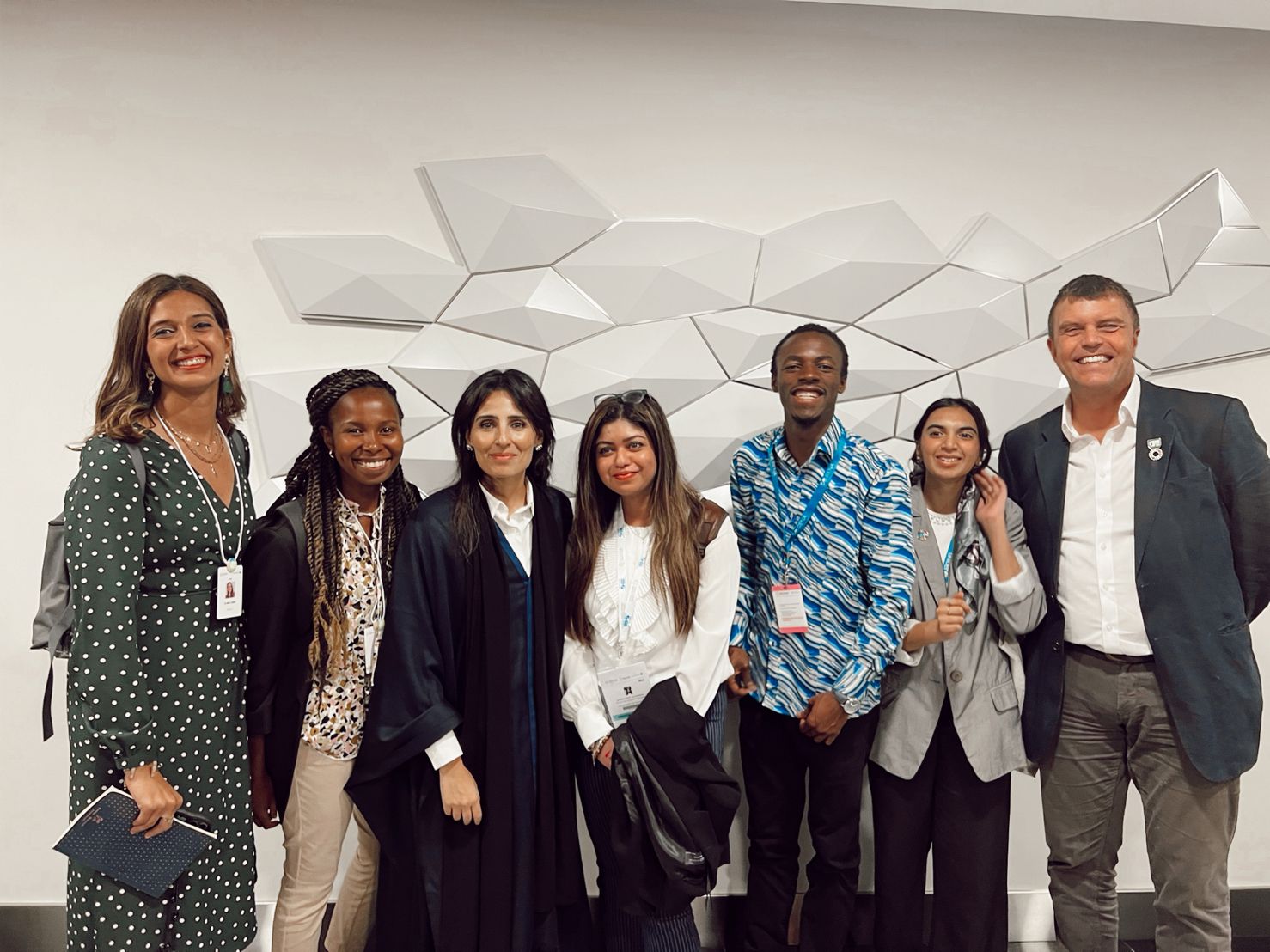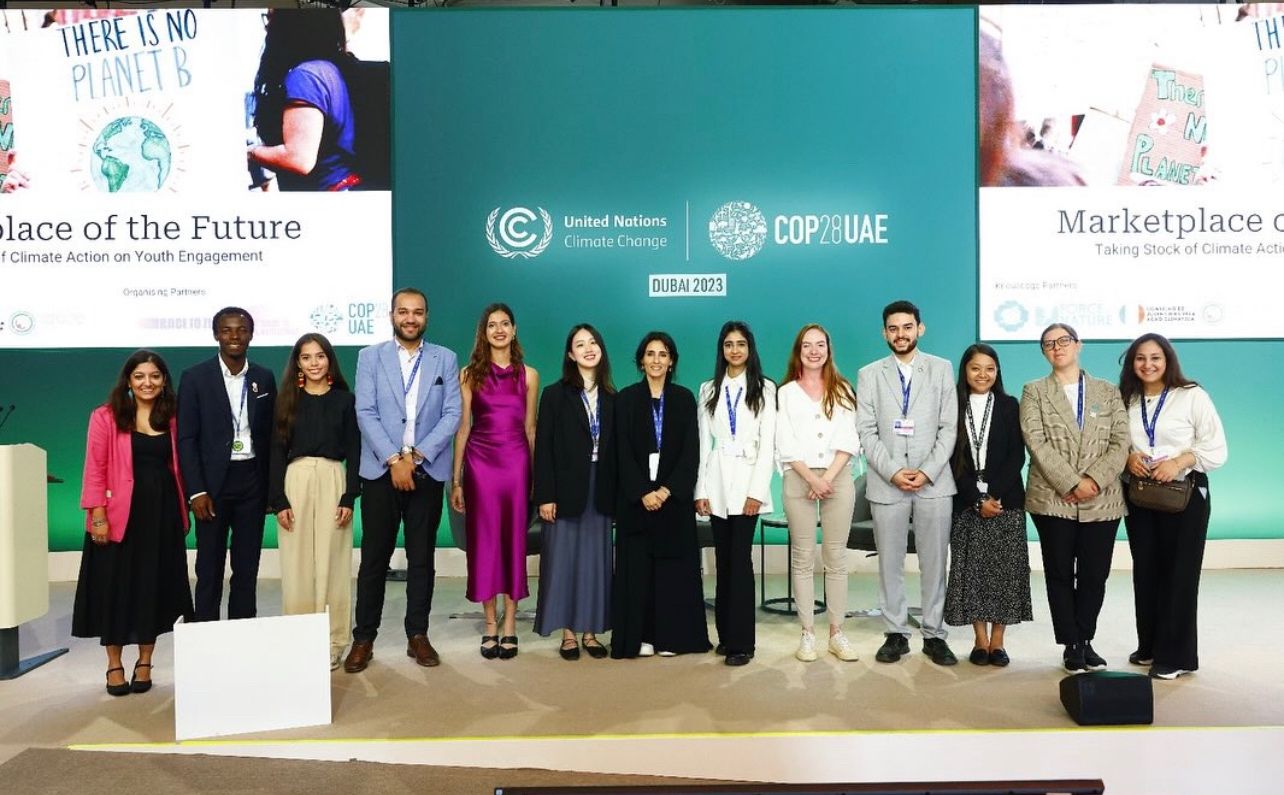In the realm where climate action intersects with youth empowerment, Dr. Omnia El Omrani from Egypt stands as a trailblazer by breaking barriers and reshaping narratives. As the inaugural Youth Envoy for the President of the 27th UN Climate Change Conference (COP27) and holding a Plastic and Reconstructive Surgery Residency, her journey is a testament to the amalgamation of medicine, activism, and global leadership.
With over seven years dedicated to climate change, 27-year-old Dr. El Omrani has facilitated more than 74 hours of capacity-building and training sessions in 15 countries worldwide. As well as her medical practice and climate activism, she has served as a Commissioner at the Lancet-Chatham House Commission on Post-COVID Population Health and has been a Youth Sounding Board member of the European Commission DG-INTPA. She is also an associate of Women Leaders for Planetary Health, a member of the Global Youth Coalition for Road Safety and part of the first cohort of the UNICEF-Az Youth Leaders Programme.
As the COP27 Youth Envoy, Dr. El Omrani is committed to engaging the world’s young population in climate action, aligning with COP’s focus on advancing climate action and implementation. Her appointment by President Designate H.E. Sameh Shoukry reflects Egypt’s commitment to empowering young people.
Her story is a testament to her dedication to climate justice, intergenerational equity, and planetary health. Explore Dr. Omnia El Omrani‘s insights and discover her perspective on one of the world’s most topical issues in our latest Hero Stories interview.
DevelopmentAid: What motivated you to become a climate activist, and how does this align with your aspirations as a doctor?
Dr. El Omrani: When selected to be COP27 President Designate’s Youth Envoy, I reminded myself of the core reason I became a doctor – to help people and to promote their health. The moral obligation as a young doctor to respond to the biggest global health emergency of the 21st century drove me to become a climate activist. My goal is to work with young people worldwide to protect the planet and future generations.
DevelopmentAid: Your path from doctor to global climate activist is truly inspiring. Can you talk us through the pivotal moments and experiences that shaped your journey, from that impactful lecture in medical school to your role as the COP27 Youth Envoy? How did your medical background influence your approach to climate action, and how have you contributed to integrating climate change into medical education?
Dr. El Omrani: My second year at medical school marked a turning point. A conference lecture on climate change’s impact on health ignited a passion that transcended individual patients. Witnessing Hurricane Irma’s devastation firsthand confirmed the urgency of global action. Shocked to find climate change absent from most medical curricula, I embarked on a seven-year mission. Research revealed the glaring gap, inspiring me to advocate for its inclusion for medical students worldwide. During this mission, I became the voice of over 1.3 million students as the Liaison Officer for Public Health Issues for the International Federation of Medical Students’ Association (IFMSA). This journey began in 2018 at the climate summit in Poland, where I tackled concerns about mental health, climate change, and public health on behalf of these students. COP25 and COP26 further shaped my path, allowing me to facilitate discussions on youth and children’s health, advocate for curriculum integration, and eventually become the COP27 Youth Envoy.
My medical background provided a crucial lens through which I understood the health consequences of climate inaction. Collaborating with deans, we successfully implemented climate change modules in medical schools across nations, ensuring future doctors are equipped to tackle this critical challenge. Being both a doctor and a climate activist allows me to bridge the gap between science and advocacy, driving both individual and collective action toward a healthier planet.

DevelopmentAid: Being a youth delegate at COP27 marked a turning point. Can you share more about your experiences working with the team at Egypt’s Ministry of Youth and Foreign Affairs?
Dr. El Omrani: Being a youth delegate at COP27 was significant. Working with the Ministry of Youth and Foreign Affairs team was collaborative and insightful. I aimed to ensure meaningful youth participation and to overcome past challenges. My goal was to make youth participation at climate summits active and prevent marginalization.
DevelopmentAid: How do you plan to promote the inclusion of global young voices and youth organizations in COP processes and agendas?
Dr. El Omrani: I aim to contribute to this by collaborating with the COP President Designate and host country teams. My focus is to ensure that youth’s perspectives are appreciated and valued by officials.
DevelopmentAid: How does the role of the Youth Envoy contribute to the global conversation on climate change?
Dr. El Omrani: The Youth Envoy acts in a liaison role, conversing and consulting with both Egyptian and international youth organizations to align management with young people’s needs globally. My role involves amplifying voices that are not represented by larger organizations, raising awareness of climate change, and engaging in a multidisciplinary approach to tackle this crisis.
DevelopmentAid: What are some of the key initiatives and achievements of the COP27 Presidency Team?
Dr. El Omrani: The COP27 Presidency Team developed a one-year strategy with objectives and indicators of success. Noteworthy achievements include integrating children and youth in the COP27 outcome decision, hosting the Children and Youth Pavilion, and the Sharm El Sheikh youth climate dialogue. Consultations with youth-led organizations globally, a global campaign for children and youth at COP, and a COP27 capacity-building toolkit are among the key initiatives.
DevelopmentAid: Can you share some of your personal achievements and contributions during COP27?
Dr. El Omrani: Moderating the COP-mandated High-level Climate Action Event, delivering keynote remarks in 30 official side events, co-authoring commentaries on children, adolescents, and youth participation in the climate agenda, and collaborating with the Egyptian Ministry of Youth and Sports were personal achievements. Additionally, being selected as a member of the New York Times Generation Climate Cohort and delivering a talk in NYT Climate Forward sessions were significant milestones.
DevelopmentAid: How do you keep in touch with younger generations worldwide to understand their climate or health-related concerns?
Dr. El Omrani: I’ve been actively engaged in the climate and youth space since 2016. Leading the health working group within Youngo, an organization with over 30,000 young people, allowed me to conduct consultations, both in-person and virtually, with various youth groups. This included interactions with the African Youth Coalition and indigenous youth groups among others. Social media, joint events, and consultations during events like COP have been instrumental in reaching and understanding the concerns of young people globally.

DevelopmentAid: Working as an adviser to influential bodies, how open are these international organizations to listening to and incorporating young people’s opinions?
Dr. El Omrani: Working with the COP Presidency and UNFCCC, I played a role in influencing the integration of children and youth in COP27 outcomes. Notably, the COP Presidency has institutionalized a youth champion role to showcase the impact of young people’s efforts. Engagement with influential organizations like UNFCCC highlights a growing recognition of the importance of incorporating young voices in global decision-making processes.
DevelopmentAid: What has your experience been like working in a globally represented body such as the Youth Sounding Board? What made you eligible for this board, and what did you value most about working in such a team?
Dr. El Omrani: The Youth Sounding Board was the first-ever board created to advise the European Commission on external partnerships. Working with a diverse team covering various fields such as law, energy, agriculture, and gender equity was enriching. My eligibility for the board stemmed from my global experience, including work with the UN, the World Health Organization, and UNICEF. The experience was characterized by a sense of leadership and meaningful interaction with the EU. The board provided a platform to learn about the workings of the EU and collaborate on interdisciplinary solutions, making it a valuable and educational experience.
DevelopmentAid: Balancing your medical studies with activism and travel must have been demanding. What were the biggest challenges you faced while juggling these commitments, and how did you overcome them?
Dr. El Omrani: Time was my biggest enemy. Demanding medical exams, 10-12 hour study days, and late-night work shifts, on top of constant travel, left me continually sleep-deprived and mentally drained. It felt like there were never enough hours in the day. But what kept me going was my burning passion for climate action and the positive impact I envisioned. Learning to prioritize, delegate tasks, and utilize every available moment became crucial. Additionally, the unwavering support of my family, especially my mother, was a constant source of strength. Looking back, the sacrifices and struggles made that journey all the more rewarding.

DevelopmentAid: Given your expertise in climate science, how do you foresee the planet’s future? Can we achieve the 1.5-degree target, and are current measures sufficient? What additional steps are needed, and is youth adequately involved?
Dr. El Omrani: The current actions, while significant, lack the urgency required for the scale of the challenge. Notable steps include the recognition of fossil fuel impact at COP28 and the establishment of a loss and damage fund at COP27, indicating a move towards reparations by developed countries. Youth is actively participating in carbon adaptation and mitigation strategies. Despite visible progress, we need sustained and collective efforts to achieve the ambitious 1.5-degree global warming limit. The involvement of young people is vital for effective climate action.

